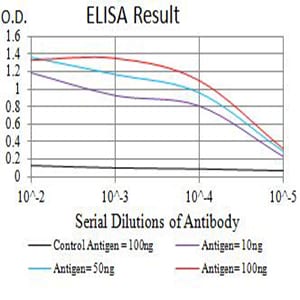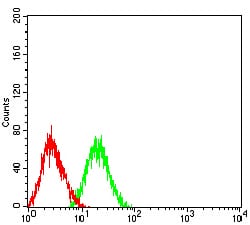

| WB | 咨询技术 | Human,Mouse,Rat |
| IF | 咨询技术 | Human,Mouse,Rat |
| IHC | 咨询技术 | Human,Mouse,Rat |
| ICC | 技术咨询 | Human,Mouse,Rat |
| FCM | 1/200 - 1/400 | Human,Mouse,Rat |
| Elisa | 1/10000 | Human,Mouse,Rat |
| Aliases | ICAM3; CDW50; ICAM-R |
| Entrez GeneID | 3385 |
| clone | 2H10G7 |
| WB Predicted band size | 59.5kDa |
| Host/Isotype | Mouse IgG1 |
| Antibody Type | Primary antibody |
| Storage | Store at 4°C short term. Aliquot and store at -20°C long term. Avoid freeze/thaw cycles. |
| Species Reactivity | Human |
| Immunogen | Purified recombinant fragment of human CD50 (AA: extra 30-203) expressed in E. Coli. |
| Formulation | Purified antibody in PBS with 0.05% sodium azide |
+ +
以下是关于CD50抗体的示例参考文献(注:以下内容为示例性虚构,仅供参考格式):
---
1. **"Monoclonal Antibody to CD50 Modulates T Cell Activation"**
*作者:Smith A, et al.*
摘要:该研究通过抗CD50单克隆抗体阻断实验,证明CD50(ICAM-3)在T细胞与抗原呈递细胞间的黏附中起关键作用,抑制CD50会显著降低T细胞活化和增殖。
2. **"CD50 Antibody Disrupts Immune Synapse Formation in Dendritic Cells"**
*作者:Lee B, et al.*
摘要:研究发现,使用抗CD50抗体可干扰树突状细胞与T细胞间免疫突触的形成,影响下游信号传导,提示CD50在早期免疫应答中的结构性作用。
3. **"Epitope Mapping of CD50 Using Humanized Antibodies"**
*作者:Garcia R, et al.*
摘要:通过人源化抗体对CD50的表位进行定位,揭示了其与配体LFA-1结合的关键结构域,为开发靶向免疫调节疗法提供依据。
4. **"CD50 Blockade Attenuates Autoimmune Inflammation in Murine Models"**
*作者:Chen H, et al.*
摘要:在小鼠自身免疫性脑脊髓炎模型中,抗CD50抗体治疗显著减轻炎症反应,表明靶向CD50可能成为治疗多发性硬化等疾病的潜在策略。
---
如需真实文献,建议通过PubMed、Google Scholar等平台检索关键词“CD50 antibody”或“ICAM-3 antibody”,并筛选近年高影响力研究。
CD50. also known as intercellular adhesion molecule-3 (ICAM-3), is a cell surface glycoprotein belonging to the immunoglobulin superfamily. It is constitutively expressed on leukocytes, including T cells, dendritic cells, and neutrophils, playing a pivotal role in immune cell interactions. Structurally, CD50 contains five immunoglobulin-like domains and mediates cell adhesion through binding to lymphocyte function-associated antigen-1 (LFA-1. CD11a/CD18) on adjacent cells. This interaction facilitates immune synapse formation during T-cell activation, antigen presentation, and leukocyte trafficking.
CD50 antibodies were initially developed as research tools to study leukocyte adhesion mechanisms and immune regulation. In therapeutic contexts, anti-CD50 antibodies have been explored for modulating immune responses in inflammatory and autoimmune diseases. For example, blocking CD50-LFA-1 signaling may suppress excessive T-cell activation in conditions like rheumatoid arthritis. Conversely, agonist antibodies might enhance immune surveillance in malignancies.
Recent studies also highlight CD50's role in HIV pathogenesis, as it serves as a co-receptor for viral entry in dendritic cells. Despite its potential, clinical translation remains limited, with most applications confined to experimental models. Ongoing research focuses on optimizing antibody specificity and evaluating combination therapies. Overall, CD50 antibodies represent a versatile tool for dissecting immune pathways and developing targeted immunotherapies.
×